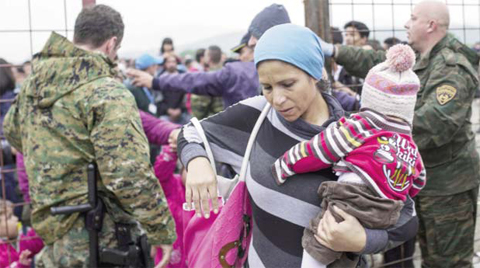 Macedonian police officers control a crowd of migrants and refugees as they prepare to enter a camp after crossing the Greek border into Macedonia near Gevgelija yesterday. Macedonia is a key transit country in the Balkans migration route into the EU, with thousands of asylum seekers and migrants - many of them from Syria, Afghanistan, Iraq and Somalia - entering the country every day. —AFP
Macedonian police officers control a crowd of migrants and refugees as they prepare to enter a camp after crossing the Greek border into Macedonia near Gevgelija yesterday. Macedonia is a key transit country in the Balkans migration route into the EU, with thousands of asylum seekers and migrants - many of them from Syria, Afghanistan, Iraq and Somalia - entering the country every day. —AFP
LUXEMBOURG: European Union governments agreed yesterday to step up deportations of illegal immigrants and discussed creating an border guard force among measures to cope with a surge in refugees from Syria’s civil war. “Increased return rates should act as a deterrent to irregular migration,” interior ministers concluded at a meeting in Luxembourg that included approving “detention” for those who may abscond before expulsion.
They also plan to exert more “leverage” on African and other poor states, including via aid budgets, to make them accept the return of citizens refused entry to Europe. In the evening, they will be joined by EU foreign ministers and delegations from Balkan states, Turkey, Jordan and Lebanon for talks on stemming migrant flows that have plunged the bloc into crisis, dividing members over how to secure the EU external borders and how to share responsibility for housing refugees. “Returns are always tough,” German Interior Minister Thomas de Maiziere said on arrival. “But ... we can only offer space and support to refugees in need of protection if those who don’t need protection don’t come or are quickly returned.”
In recent years, fewer than 40 percent of people whose asylum claims are rejected have actually then left the EU. Also being discussed are closer cooperation on external frontiers, especially in the Mediterranean, from where hundreds of thousands have made their way north, prompting some countries to suspend passport-free travel inside Europe’s Schengen area.— Reuters

